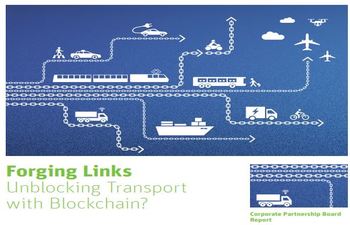Knowledge Hub
Already a major contributor to global heating, transport is the sector with the highest forecasted emissions growth. Experts agree: the time for action is now, as transport emissions must be reduced significantly over this decade if we are to achieve carbon neutrality by mid-century and minimize dangerous climate change.

Forging Links: Unblocking Transport with Blockchain?
2021
Author(s): International Transport Forum (ITF)
This report assesses the potential of Distributed Ledger Technology (DLT) to address persistent transport policy challenges and provides transport policy makers with recommendations on how to maximise the benefits of DLTs in the transport sector.
Safe Drive Initiative: Creating Safe Autonomous Vehicle Policy
2020
Author(s): World Economic Forum (WEF)
This review is the first in a series of documents published by the World Economic Forum to offer holistic guidance on autonomous vehicle policy. By engaging with industry partners, regulators, academia and civil society, the Safe Drive Initiative proposes a broad and actionable framework to enable policy-makers to create a graduated series of milestones to enable the safe deployment of automated vehicles.
The industry’s rapid development has encouraged regulators around the world to introduce AV policy frameworks to enable the safe experimentation and development of the technology. Approaches to AV policy vary greatly between nations and other jurisdictions, and all are relatively nascent.
Switching to Sustainable Auto-rickshaw System (Namma Auto Project)
2020
Author(s): European Union (EU), SWITCH-Asia SCP Facility
The Switching to Sustainable Auto-rickshaw System (Namma Auto project) was designed on an “ecosystem” approach, working closely with the driver communities, giving them access to financial services, engaging with policy makers as well as industry players.
The global automobile fleet is rapidly transitioning away from fossil fuels. India has shown its desire, but it lacks a consistent strategy and road map.
Improving Battery-Electric-Vehicle Profitability Through Reduced Structural Costs
2020
Author(s): Breiter A, Hackert P, Han W, Hensley R, Schwedhelm D
Battery electric vehicles (BEV) profitability will continue to face headwinds from high e-drive and battery costs, as well as the need for high investments at a time when sales volumes remain challenged.
How Charging in Buildings Can Power up the Electric-Vehicle Industry
2021
Author(s): Hoover Z, Nägele F, Polymeneas E, Sahdev S
In the next five years, more than 50 million electric vehicles will be on the road. Updating charging infrastructure is crucial to the industry's growth.
Private Autonomous Vehicles: The Other Side of the Robo-Taxi Story
2020
Author(s): Doll G, Ebel E, Heineke K, Kellner M, Wiemuth C
Autonomous driving (AD) has attracted a lot of attention in recent years. AD represents a huge opportunity to transform mobility. Road safety would increase, and drivers would have more time to relax in vehicles rather than focus on the road.
Pathways To Decarbonize Passenger Transportation: Implications to India’s Climate Budget
2021
Author(s): Das D, Kalbar PP, Velaga NR.
The present study focuses on assessing contribution of electric vehicles (EVs) with improving electricity grids’ efficiency (EGs) and minimizing ‘transmission and distribution’ (T&D) losses in reducing carbon dioxide (CO2) emissions and fulfilling emission targets for 2030 and 2050.



